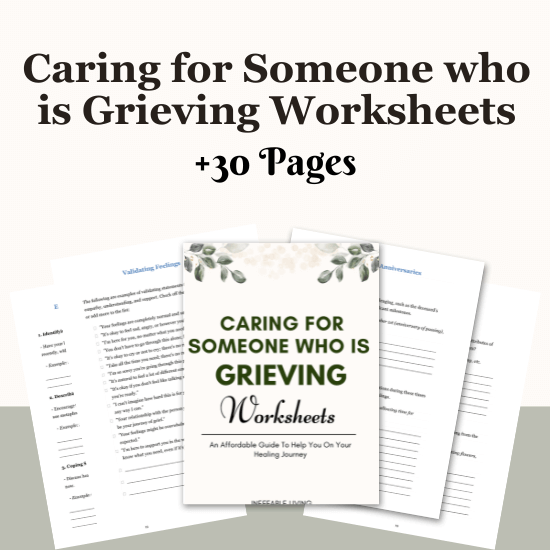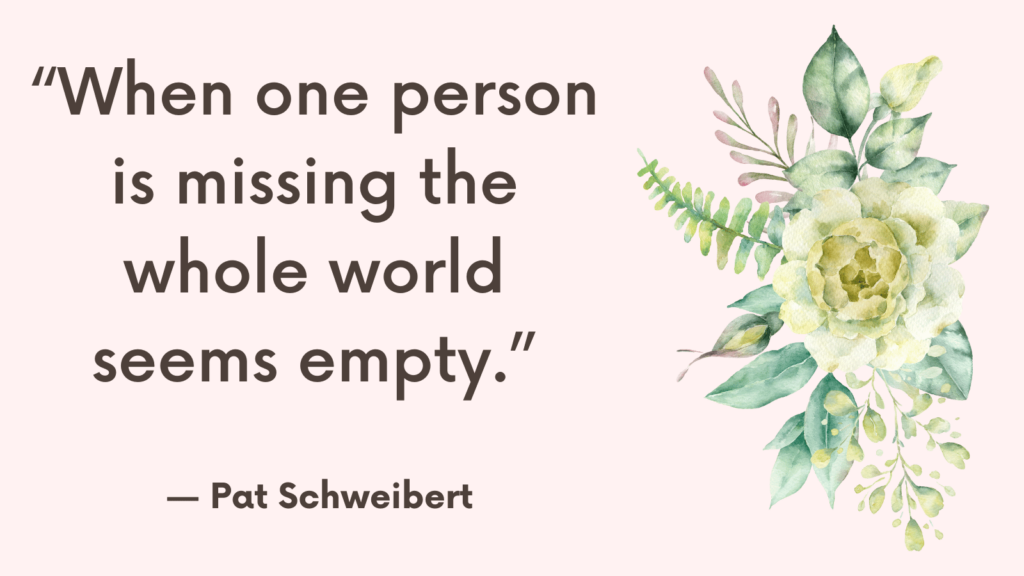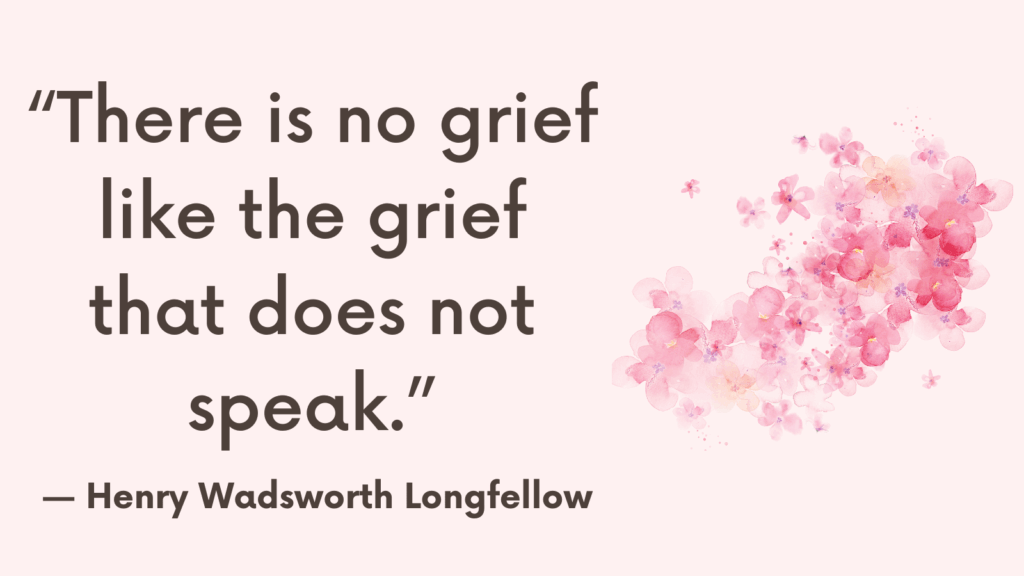This post contains top ways grief show up in the body.
Understanding How Grief Manifests in the Body
Grief is a profound human experience that extends beyond emotional symptoms to include numerous physical reactions.
Many of us are familiar with the emotional aspects of grief, such as sadness and anger, but its physical impact is often less discussed and poorly understood.
Grief is not just an emotional process that happens in our minds; it’s a whole-body experience.
When we understand the physical symptoms of grief, we are better prepared to manage them.
Dr. Dorothy Hollinger, author of The Anatomy of Grief, explains that our bodies respond to the loss just as intensely as our hearts and minds.
Related: Best +30 Grief Activities For Adults (+FREE Worksheets PDF)
Ways Grief Show Up In The Body
1. Heart Health Impacts
Grief can stun the heart and lead to conditions like broken heart syndrome, where intense emotional distress causes functional changes in the heart muscle itself.
This syndrome can mimic a heart attack, with symptoms such as chest pain and shortness of breath.
It’s particularly noted in older individuals, where the stress of loss can increase the risk of heart attacks significantly within days following the loss of a loved one.
2. Changes in Appetite and Digestion
The stress response associated with grief often leads to decreased appetite and disruption of digestive processes.
For some, this manifests as significant weight loss, while others might find themselves eating more and gaining weight.
The key is the body’s response to stress, which alters normal digestion and appetite regulation.
Related: Grief Comes In Waves: Top 12 Lessons From Grief No One Talks About
3. Sleep Disturbances
Insomnia and other sleep disturbances are common in grief.
The mind’s struggle to process loss frequently leads to trouble falling asleep or staying asleep, compounding fatigue and affecting overall health.
4. Immune System Suppression
Grief can weaken the immune system, making one more susceptible to illnesses.
This isn’t just a metaphorical “sickness” of the heart but a tangible drop in the body’s ability to fight infections.
5. Physical Pain and Discomfort
Many grieving individuals report unexplained pains, headaches, and general discomfort, which are not linked to any physical ailment but rather to the emotional turmoil they are experiencing.
6. Crying and Tears
Tears associated with emotional pain are chemically different from those caused by physical irritants.
They contain higher levels of stress hormones, which suggest that crying can be a healing process, helping to relieve emotional stress.
Why Do These Symptoms Occur?
The physical symptoms of grief are largely due to the body’s stress response.
When you grieve, your body perceives the emotional pain as stress and reacts in the same way it would to a physical threat — by activating the sympathetic nervous system.
This response, often referred to as the “fight-or-flight” response, releases stress hormones like cortisol and adrenaline, which can affect various body systems, leading to the symptoms described above.
Related: Resilient Grieving: Best 17 Ways To Manage Grief In The Workplace (+FREE Grief Worksheets)
How to Cope with the Physical Symptoms of Grief?
1. Acknowledge and Accept Your Grief
The first step in coping with the physical symptoms of grief is to recognize and accept your grief.
Denying it only leads to prolonged distress.
Acknowledgement allows you to deal with grief head-on and can help mitigate some of the stress that exacerbates physical symptoms.
2. Establish a Routine
Maintaining a daily routine can provide a sense of normalcy during a time of chaos.
Try to get up, eat, exercise, and go to bed at the same times every day.
Structure can be incredibly grounding and can help regulate your sleep and appetite cycles.
3. Prioritize Good Nutrition
Grief can lead to loss of appetite or overeating.
Try to consume balanced meals rich in fruits, vegetables, whole grains, and lean proteins.
Good nutrition can combat fatigue and help stabilize mood swings.
Related: Best 21 Grief Journaling Prompts (+FREE Grief Worksheets PDF)
4. Stay Active
Exercise releases endorphins, chemicals in your brain that act as natural painkillers.
Even light activities such as walking or yoga can reduce stress and improve sleep.
5. Seek Social Support
Connecting with others who understand what you are going through can be beneficial.
Support groups, whether in-person or online, can provide comfort and practical advice for managing grief.
6. Consider Professional Help
If your physical symptoms are severe or do not gradually improve, consider seeking help from a healthcare professional.
This could be a general practitioner who can address the physical symptoms, or a mental health professional skilled in grief counseling.
Related: Cumulative Grief: How To Cope With Bereavement Overload?
7. Practice Relaxation Techniques
Techniques such as deep breathing, meditation, and progressive muscle relaxation can activate the parasympathetic nervous system, the body’s natural counterbalance to the stress response.
8. Monitor Your Sleep
Good sleep hygiene is crucial for physical health.
Create a calming bedtime routine, limit screen time before bed, and make your sleeping environment comfortable and conducive to rest.
Related: Explanation of Grief Ball In a Box
9. Journaling
Writing about your feelings and experiences can be a therapeutic way to process grief.
It can also offer insights into how your grief is affecting you physically and emotionally.
10. Mindful Awareness
Practicing mindfulness can help you stay present and more aware of your body’s needs.
Mindfulness involves observing the present moment without judgment and can help you detect early signs of stress or fatigue in your body before they become overwhelming.
Related: How To Rebuild Your Life After Death Of Spouse?

Conclusion
While the journey through grief is undeniably challenging, understanding and addressing the physical symptoms can alleviate some of the burden.
By implementing the coping strategies outlined above, you can support your body through this difficult time, paving the way for healing both physically and emotionally. Remember, grief is



